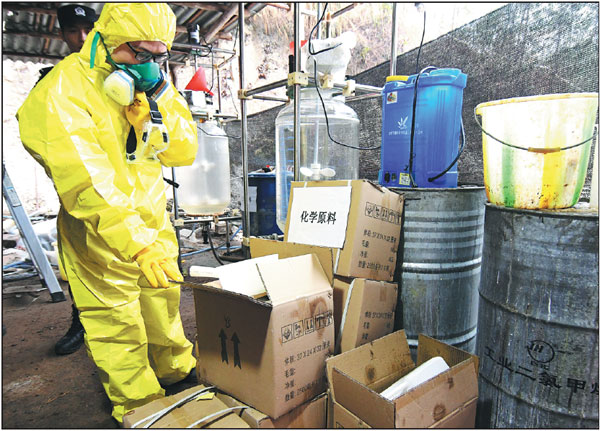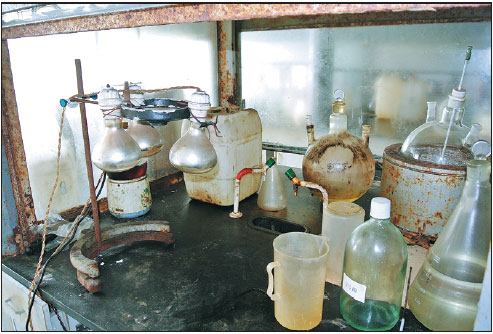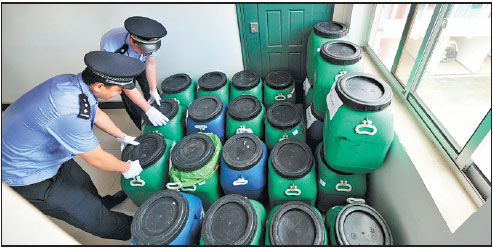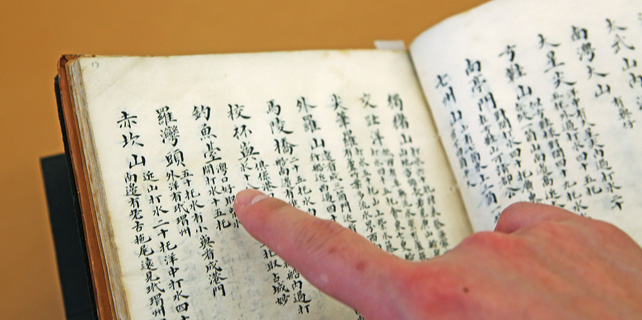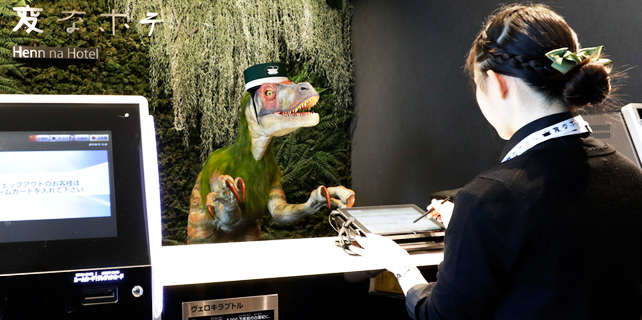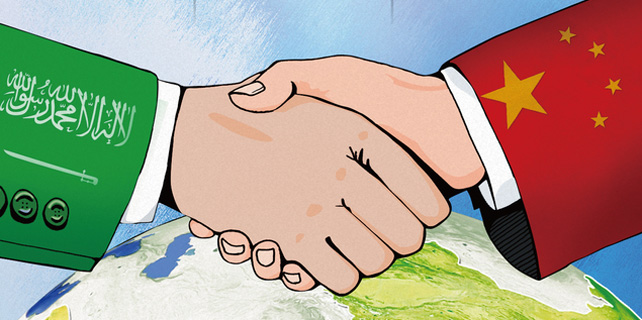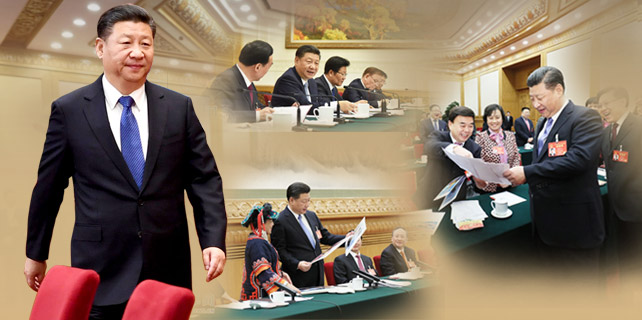Police move to tackle rise of 'white-collar' drug producers
In a development that echoes TV's Breaking Bad, some Chinese chemistry professionals have begun producing and selling illegal substances. Zhang Yi reports.
The manufacture and distribution of illegal narcotics is undergoing a transformation in China.
While a large part of the problem remains the involvement of criminal gangs and street thugs who control the localized trade, the emergence of sophisticated labs and international distribution networks set up by white-collar entrepreneurs is presenting a new challenge for the authorities.
At present, the most abused illicit drug in China is methamphetamine, also known as "ice". In 2015, methamphetamine was available at about 50 to 100 yuan ($7 to $14) per 0.1 gram, according to the Beijing police authority. At the end of the same year, there were 2.3 million registered drug users in the country, official data show.
In June last year, Wang Hua, a chemistry graduate who attended the prestigious Peking University in Beijing, was arrested for producing methcathinone, a highly addictive stimulant drug known by street names such as "meth cat", "jeff", or "bathtub speed".
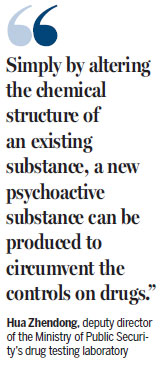
In 2005, the recreational drug, which produces a similar effect to methamphetamines or amphetamines, was included in the list of controlled substances by the China Food and Drug Administration.
In April 2014, in a move that has echoes of the global TV hit Breaking Bad, Wang quit his job at a pharmaceutical company in Shanghai and set up his own company in Huanggang, Hubei province. The 30-something put his cousin in charge of methcathinone production and asked his wife to purchase the raw materials and liaise with buyers.
Wang was found to have mailed 630 kilograms of methcathinone, stashed in the tubes of light-emitting diodes, to buyers overseas through courier services. The Hubei police seized 55 receipts for sales between Oct 1, 2015, and June 8 last year, which generated an estimated profit of more than 10 million yuan.
Third generation
Wang is just one in a long line of chemistry professionals who are producing new psychoactive substances, also known as NPS, a type of illicit narcotic regarded in China as "third generation" drugs.
The United Nations Office on Drugs and Crime defines the new drugs as "substances of abuse, either in a pure form or a preparation, that are not controlled by the 1961 Single Convention on Narcotic Drugs or the 1971 Convention on Psychotropic Substances, but which may pose a public health threat".
The NPS are easily synthesized in labs, rather than being obtained via natural sources such as opium poppies, which means production costs are far lower, said Hua Zhendong, deputy director of the Ministry of Public Security's drug-testing laboratory.
The lack of regulation has led to these new narcotics becoming known as "designer drugs", "legal highs", "herbal highs", "bath salts", "research chemicals" and "laboratory reagents".
The new drugs mimic the effects of controlled substances, such as cannabis, amphetamines or heroin, and are sometimes traded alongside them as the makers exploit loopholes in drug control legislation.
Lucrative business
A number of Chinese chemistry professionals have been unable to resist the lucrative business opportunities offered by NPS, which, although widely abused in other countries, are almost unknown in China. That means some of them have slipped below the radar of the nation's drug authorities, according to Hua, from the ministry.
Zhang Zhengbo, 45, a former chemistry professor at Huazhong University of Science and Technology in Wuhan, capital of Hubei province, used to be one of China's leading manufacturers of NPS. During his time as a visiting scholar in Australia, Zhang discovered that some countries have huge markets for NPS, and realized that some of the new drugs widely abused overseas were not classed as controlled substances in China.
The 45-year-old and Yang Zhaohui, a former classmate, established a chemical company. They registered as a producer of pharmaceutical intermediates, but instead manufactured methcathinone and sold it in the United States and Europe under the guise of regular chemical products.
In June 2015, Zhang and seven of his employees were arrested and charged with selling more than 300 kg of methcathinone to buyers overseas. The case has been handed over to the prosecuting authorities.
Ministry in action
At present, there are no coordinated international controls on NPS, although several countries have established permanent measures for cracking down on certain substances and others have issued temporary bans.
In recent years, the Ministry of Public Security has stepped up international collaboration efforts to crack down on the production of NPS.
In Zhang's case, the ministry contacted authorities in more than 20 countries and reported 1,144 clues that will assist in their investigations of cases within their jurisdictions.
In the latest move, the ministry has added four types of synthetic opioids - including carfentanyl, a widely used elephant tranquilizer - to its list of controlled substances.
On March 1, four types of fentanyl-based substances were added to the list of Non-pharmaceutical Narcotic Drugs and Psychotropic Drugs under Control, raising the number of controlled substances in China to 134.
Last year, police found 66 samples of fentanyl-based substances nationwide, a marked rise from the six unearthed from 2012 to 2015.
"More than 10 people suspected of producing NPS have been detained and more than 800 kg of substances has been seized since the beginning of last year. More than 1 metric ton of these, as yet, uncontrolled substances was also seized," said Yu Haibin, head of the department at the ministry that is tasked with curbing the production of illicit drugs.
However, a lack of testing equipment outside of big cities means the police face challenges uncovering NPS abuse.
According to Hua, most local police stations lack equipment to test for NPS, so when police officers decide to test people suspected of using drugs in a public place, they have to collect urine samples and then send them to the ministry's national-level laboratory.
"It takes time to send the results back to the local police, and it takes even longer to enact legislation to ban newly discovered substances," he said.
"In addition, simply by altering the chemical structure of an existing substance, a new psychoactive substance can be produced to circumvent the controls on drugs," he noted, adding that when one drug becomes subject to strict controls, a new, modified substance can quickly be created by fast-acting chemists looking to stay one step ahead of the law.
Contact the writer at zhang_yi@chinadaily.com
|
Police officers inspect confiscated drugs worth 30 million yuan ($4.3 million), including 1.7 metric tons of methcathinone, in Nanning, the Guangxi Zhuang autonomous region, in January.Song Bingjia / For China Daily |
|
A drug lab used by Zhang Zhengbo, a former chemistry professor in Wuhan, Hubei province.Provided To China Daily |
|
Police officers seize 650 kilograms of methcathinone in Changsha, Hunan province.Long Hongtao / Xinhua |
(China Daily 03/20/2017 page6)







